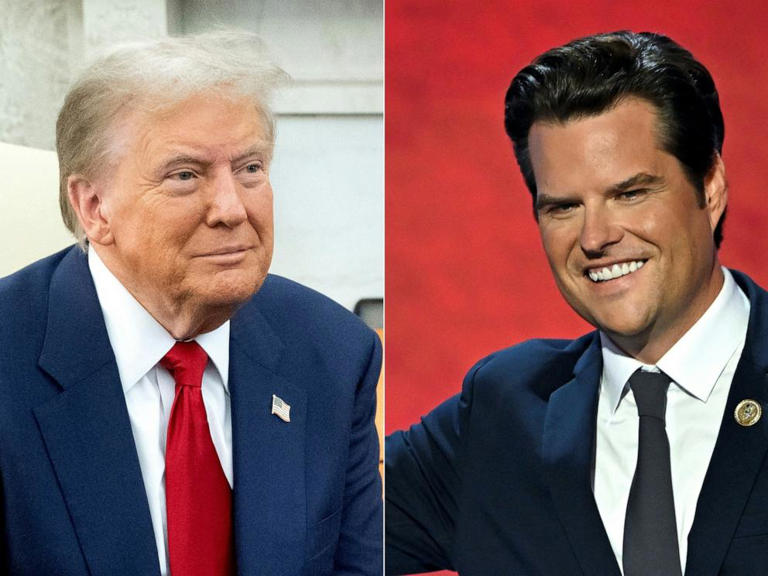
President-elect Donald Trump and Rep. Matt Gaetz. © AFP via Getty Images
President-elect Donald Trump has selected Republican Rep. Matt Gaetz of Florida as his nominee for attorney general, a decision that is already stirring up significant controversy. Trump made the announcement via a post on his Truth Social platform, emphasizing Gaetz’s commitment to ending what he describes as the “weaponization” of the justice system.
Trump stated, “Matt will end Weaponized Government, protect our Borders, dismantle Criminal Organizations, and restore Americans’ badly-shattered Faith and Confidence in the Justice Department.” Gaetz, a staunch Trump loyalist and conservative voice, expressed his honor at being chosen for the role, posting on X (formerly Twitter) that it would be a privilege to serve as attorney general.
The selection of Gaetz is expected to spark a contentious confirmation process in the Senate, given his relatively limited experience in law compared to recent attorneys general. Although Gaetz holds a law degree from William & Mary Law School, his professional background has been largely in politics rather than legal practice. He has been a member of Congress since 2017, where he gained national attention for his outspoken support of Trump and his criticism of the Justice Department, which he believes has been weaponized against conservatives.
A Provocative Nominee
Gaetz’s selection is especially provocative due to his past entanglements with the Justice Department. In 2022, the department declined to pursue criminal charges after a yearslong investigation into alleged sex trafficking involving Gaetz. Though he has denied any wrongdoing, including accusations of paying for sex or engaging in inappropriate relations with minors, the investigation’s findings remain confidential. If confirmed as attorney general, Gaetz would oversee the department that investigated him and would have access to sensitive files related to his case.
Despite these legal entanglements, Gaetz has continued to criticize the Justice Department’s actions, particularly those involving Trump and the January 6th Capitol riot. He has argued that the FBI and DOJ have overstepped their bounds in targeting conservatives, and has even called for the dismantling of these agencies unless they are radically reformed. In 2023, at the Conservative Political Action Conference, Gaetz declared, “We either get this government back on our side, or we defund and get rid of, abolish the FBI, the CDC, ATF, DOJ, every last one of them if they do not come to heel.”
As a member of the Select Subcommittee on the Weaponization of the Federal Government, Gaetz has been a vocal advocate for limiting federal agencies’ authority and bringing in outsiders to reform them. He has particularly criticized career officials within the DOJ, arguing that they have allowed the department to be “captured” by political forces.
Resignation and Confirmation Process
In a move that will likely smooth his nomination process, Gaetz resigned from his House seat on Wednesday, as confirmed by House Speaker Mike Johnson. This decision was reportedly made so that Republicans could fill his seat before the new Congress convenes on January 3, 2025. House Ethics Chair Michael Guest stated that Gaetz’s resignation would end an ongoing ethics investigation into allegations of sexual misconduct, as the committee’s jurisdiction ends once a member resigns.
The ethics investigation into Gaetz was launched in 2021, prompted by a referral from the DOJ. Allegations against Gaetz include sexual misconduct, drug use, and providing improper gifts and favors. Gaetz has denied these claims and has repeatedly denied ever seeking a pardon from Trump related to the investigation, despite reports that he requested one during Trump’s first term.
Shockwaves and Reactions
Trump’s announcement of Gaetz as his attorney general pick sent shockwaves through both the Justice Department and Capitol Hill. Inside the DOJ, staff reportedly reacted with disbelief, and similar surprise was expressed by members of Congress. Republican lawmakers, many of whom had not heard Gaetz’s name as a potential nominee, were stunned by the choice. Some, like Rep. Thomas Massie of Kentucky, expressed support, suggesting Trump should push forward with a recess appointment if Gaetz is not confirmed by the Senate.
However, many Senate Republicans have expressed concern about Gaetz’s ability to secure confirmation. Some have pointed to the ongoing investigations into Gaetz and his contentious role in the ousting of former House Speaker Kevin McCarthy as potential stumbling blocks. Sen. Lindsey Graham of South Carolina was cautious, stating he would need to carefully consider the nomination, while Sen. Kevin Cramer of North Dakota raised concerns over the thoroughness of the FBI background check, which is a key part of the confirmation process.
Challenges Ahead for Gaetz
The path ahead for Gaetz’s nomination appears to be fraught with challenges. With ongoing investigations into his conduct and his controversial stance on the DOJ, Gaetz will need to navigate significant scrutiny during his confirmation hearings. The Senate is expected to thoroughly vet the nominee, with questions about his qualifications, past actions, and legal entanglements likely to dominate the proceedings.
Despite these challenges, some of Gaetz’s supporters, including Rep. Thomas Massie, argue that Trump should proceed with a recess appointment if Senate confirmation proves difficult. Meanwhile, Trump’s other cabinet picks, including Florida Senator Marco Rubio as secretary of state, have also drawn attention as he continues to shape his second-term administration.
As Gaetz’s confirmation process unfolds, all eyes will be on how the Senate handles the highly unusual nomination of a sitting congressman with significant legal controversies. If confirmed, Gaetz would take control of the nation’s top law enforcement agency at a time of deep political division, with his tenure likely to be closely watched by both supporters and critics alike.






